TYPES OF GUEST FOLIOS
1 like14,234 views
This document discusses different types of folios used in hotel front offices to record guest transactions. It describes guest folios, which are created for individual guests to track charges and payments. Master folios contain information for an entire group. Non-guest and employee folios track transactions for non-residents and staff. Split folios allow guests to separate business and personal expenses. Folios begin with a zero balance and aim to return to zero upon checkout after recording all credits and debits.
1 of 13
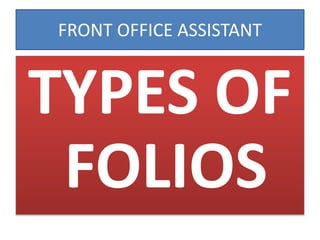


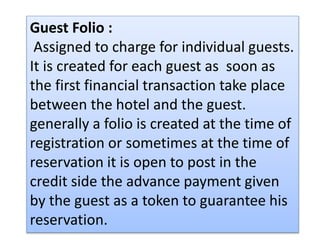
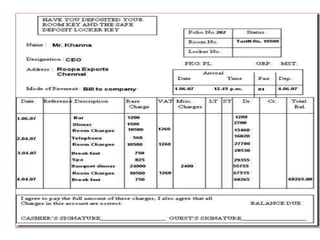

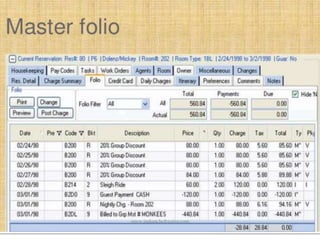

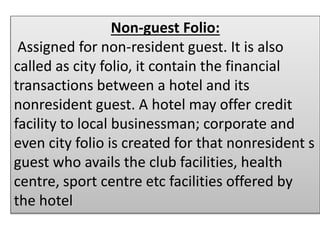
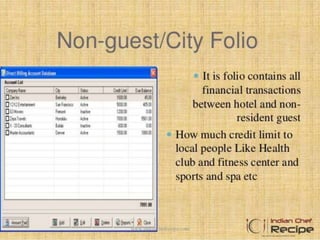
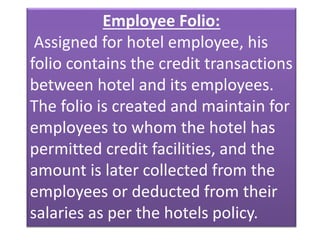


Recommended
Hotel Front Office Department



Hotel Front Office DepartmentSaurabh Bharti
Ėý
Front office department of a hotel - It is the face of the hotel, the voice of a business.
It works 365 days, 24x7. The front office communicate and coordinate with all other departments of the hotel as well as external sources, running its operations day to operations smoothly to make the guest stay more comfortable through providing personalized, consistent standard services as per management policyArrival Procedure in Hotels, registration, check in



Arrival Procedure in Hotels, registration, check inInstitute of Hotel Management, Hajipur, Patna, Bihar.
Ėý
The document discusses the second stage of the guest cycle, which is arrival, pre-registration, registration, room assignment, and rooming. It covers topics like the registration process, check-in procedures for different guest types, documents generated during check-in, and ensuring a pleasant guest experience during arrival and room assignment. The key moments of truth during this stage are making a memorable first impression on guests and handling the registration process efficiently yet personalized for each guest.Front office accounting



Front office accountingBhavess
Ėý
Front office accounting involves creating and maintaining guest and non-guest accounts, tracking financial transactions, monitoring credit limits, and providing management reports. It uses various types of accounts and vouchers to record transactions between guests, non-guests, and the hotel. Key functions include maintaining folios for individual and group accounts, as well as ledgers organized by guest and city accounts to collect the folios. Cash banks are also used to provide cash for transactions during shifts.Front Office Accounting



Front Office AccountingGITAM University
Ėý
A front office accounting system monitors and records financial transactions throughout a guest's stay at a hotel. It includes tasks like creating guest accounts during the reservation process or at check-in, tracking charges and payments during occupancy, and settling accounts at check-out. Effective accounting requires maintaining accurate guest folios, recording vouchers from various departments, and summarizing transactions in ledgers.Night Audit in Front Office



Night Audit in Front OfficeArpendra Chauhan
Ėý
Night Audit in Front Office
Introduction
Functions of Night Audit
Duties of Night Auditor
Audit Posting Formula
Bucket Check
Night Audit Process
Night Audit Reports
Rate Variance Report
Revenue Report
Occupancy Report
Commission Report
High Balance Report
Operating Modes
Important TerminologiesHotel departments



Hotel departmentsAMS Malicse-Somoray
Ėý
This document summarizes the key departments in a hotel's organizational structure. It divides departments into revenue centers, which directly generate income, and cost centers, which support revenue-generating functions. Revenue centers include front office, food and beverage, and sales and marketing. The document also distinguishes between "front of house" departments like front desk and food service that interact with guests, and "back of house" ones like housekeeping and engineering with limited guest contact. It provides examples of department heads and briefly outlines some core responsibilities of rooms division, food and beverage, and other operational areas.FRONT OFFICE ORGANISATION IN HOTEL



FRONT OFFICE ORGANISATION IN HOTELindian chefrecipe
Ėý
This document discusses front office organization and operations in hotels. It provides organizational charts for small, medium, and large hotels. It outlines the duties and responsibilities of front office staff roles like the front office manager, desk manager, front office agent, cashier, bell captain, bell boy, and concierge. It also describes how the front office coordinates with other hotel departments and the important attributes of front office personnel, including good communication skills and a courteous demeanor. Finally, it provides guidance on telephone etiquette and standard phrases used in guest interactions.Reservation Procedure in Hotels, Amendment, Cancellation, Modes, Channels



Reservation Procedure in Hotels, Amendment, Cancellation, Modes, ChannelsInstitute of Hotel Management, Hajipur, Patna, Bihar.
Ėý
The document discusses the importance of reservations for both hotels and guests. It provides assurances and choices for guests while helping hotels with planning, expenses, revenue management and more. The document then covers reservation definitions, processes, systems used (manual, semi-automated, automated), types of reservations, modes of booking, sources of reservations, and other key aspects like cancellation policies, amendments and various reports used for reservations.Handling guest mails and messages in hotels



Handling guest mails and messages in hotelsAnjalikannur
Ėý
Handling guest mail and messages is an important front desk function. It involves sorting incoming mail for guests into categories like present guests, checked out guests, and guests not yet arrived. Messages left for in-house guests are recorded on message slips that are delivered to guests. Outgoing mail involves weighing and stamping guest mail, and keeping records of postage. Proper handling of mail and messages helps ensure efficient hotel operations and good guest service.Hotel Front Office & Guest Handling (Guest Cycle) Updated version 23/03/2021



Hotel Front Office & Guest Handling (Guest Cycle) Updated version 23/03/2021Institute of Hotel Management, Hajipur, Patna, Bihar.
Ėý
PPT for students of 2nd semester of hotel management, it gives a brief but adequate understanding of the concepts related to Guest Cycle in modern hotels. Hotel property management system. PMS



Hotel property management system. PMSInstitute of Hotel Management, Hajipur, Patna, Bihar.
Ėý
Basics of hotel property management system, especially the software part, and the many modules in them.Hotel fo front office cashiering procedure



Hotel fo front office cashiering procedureThantZin97
Ėý
The document outlines the cashiering procedure at a hotel. It discusses the different types of guest accounts including pay on own accounts (POA) settled by guests and city ledgers settled by travel agents or companies. It explains how bills are posted and checked by the night auditor and information is prepared. The cashiering procedure includes greeting guests at departure, reviewing bills, processing payments by currency, credit card or through agents, and recording guest history. Types of payments and accounts are summarized.Layout of front office & various sections of FO



Layout of front office & various sections of FOHarshDhaliwal
Ėý
The document discusses the layout and sections of the front office department in a hotel. It describes the key areas of the front office which include reception, reservations, bell desk, information desk, cash and bills, night auditor, and travel desk. Each section handles specific front office tasks such as receiving guests, room bookings, providing guest information, overseeing finances, and nightly audits. The front office operates 24/7 and is the primary contact area for all hotel guests.REGISTRATION PROCEDURES OF FRONT OFFICE IN HOTEL



REGISTRATION PROCEDURES OF FRONT OFFICE IN HOTELindian chefrecipe
Ėý
The document discusses hotel guest registration procedures. It describes the registration process, including gathering guest information, maintaining registration records, and different methods of record keeping like hard-bound registers, loose-leaf registers, and individual guest registration cards. It also outlines the importance of registration information, pre-registration activities, and post-registration steps like notifying other departments of guest arrivals and departures.Front office Operations and Reservation 



Front office Operations and Reservation Md Shaifullar Rabbi
Ėý
Session on Front office Operations; Reservation Form, Group Reservation ,cancelation Process, confirmation, Arrival, Reception and check in, check out Process.Guest services



Guest servicesSushant Bijlani
Ėý
The document provides details about various guest services provided by hotel front offices such as handling guest mail, messages, room keys, safe deposit lockers, room changes, left luggage, wake-up calls, and guest complaints. It describes the standard procedures followed for each service, including logging mail, sorting messages for current vs past guests, checking keys in and out, filling out forms for room moves, and tactfully handling complaints. The goal is to address guests' basic needs and requests during their stay.Room & Rate Assignment



Room & Rate Assignmentjheica
Ėý
Room Assignment
Room Assignment involves identifying and allocating an available room in a specific room category to a guest.
On the basis reservation information, specific rooms and rates may be pre-assigned to the guest.
To best satisfy guest request, front desk agents must know the differences between room types and be capable of querying the system to determine each guestroomâs rate, occupancy status, furnishings, location, and amenities.
Typical room status descriptions: Occupied, Vacant, On-change, and Out-of-order.
Assigning Room Rate
Room Rate â is the price a hotel charges for overnight accommodations; the standard or non-discounted rate for a room is called the ârack rateâ
Room rates are typically confirmed as part of the reservation process
Special room rates may include: commercial or corporate, complimentary, group, family, Day, package-plan, and frequent traveler
Room rates may include a dining room plan: American Plan, Modified American Plan, or European Plan.
Introduction to the front office- (detailed )



Introduction to the front office- (detailed )Institute of Hotel Management, Hajipur, Patna, Bihar.
Ėý
a detailed presentation to inform the students about the workings of the front office department of a large hotel.Chapter 1 front office practice



Chapter 1 front office practiceUUM
Ėý
This document provides an introduction to front office departments in hotels. It describes the key functions of front office which include communication and accounting. It also outlines the organizational structure of front office departments and job responsibilities of front office personnel such as the front office manager, receptionist, bell boy, and others. Finally, it discusses the different stages of the guest cycle in a hotel from pre-arrival to departure.Hotel guest cycle



Hotel guest cycleDr. Bhavya Khamesra
Ėý
these are various stages in the hotel. a guest checks in hotel. prearrival stage, during stay activities, departure and post departure activities Front Office(Pre-arrival procedure for FIT, VIP & Groups)



Front Office(Pre-arrival procedure for FIT, VIP & Groups)Pratik Lahiri
Ėý
This document outlines pre-arrival procedures for different types of hotel guests. For individual travelers (FITs), staff should verify reservations, confirm arrival details, and collect deposits if necessary. For VIPs, reservations require approval and special designations, and preparations like room blocking and notifications to other departments are needed in advance. For groups of 10 or more, staff should review profiles and needs, check rooming lists and billing instructions, communicate special requirements to other teams, and confirm arrival details with coordinators.Coordination with other depts



Coordination with other deptsDr. Bhavya Khamesra
Ėý
The front office coordinates with many other hotel departments to ensure smooth operations. It provides housekeeping with guest room status and special requests. It informs food and beverage about guest arrivals and departures for meal planning and minibar stocking. It aids marketing by sharing guest histories and room availability data. It coordinates with security on lobby monitoring, emergencies, and disruptive guests.Chapter 8: Front Office Accounting



Chapter 8: Front Office AccountingNicole Hay-Walters
Ėý
This document discusses front office accounting fundamentals and processes. It covers topics like creating and maintaining front office accounts, folios, vouchers, points of sale, and ledgers. Specifically, it describes how front office accounts are created for guests and non-guests during check-in and reservations. It also explains how transactions are recorded on folios to track charges and payments. The document highlights how automated systems now integrate these front office accounting functions.Night Audit



Night AuditGITAM University
Ėý
The night audit involves verifying guest accounts and transactions, balancing department accounts, resolving discrepancies, and producing reports for management. Key tasks include posting room rates and taxes, reconciling food and beverage charges, verifying cash deposits, and producing a daily operations report with metrics like occupancy percentage. The night auditor acts to ensure account accuracy, protect hotel revenue, and monitor credit limits on high balance accounts.Bell desk



Bell deskDr. Sunil Kumar
Ėý
The bell desk handles several important functions at the hotel. They greet guests and safely transport luggage from vehicles to the front desk for check-in. Bell desk staff also page guests if they are needed elsewhere in the hotel. Additionally, they deliver mail, messages, newspapers and magazines to guest rooms and keep records of distributions. The bell desk ensures smooth operations and excellent guest service.Chapter 11: The Front Office Aduit



Chapter 11: The Front Office AduitNicole Hay-Walters
Ėý
The document discusses the front office audit process in a hotel. It describes the functions of a front office audit as verifying guest transactions, balancing accounts, and generating reports. The front office auditor tracks statistics, summarizes daily transactions, and reconciles account postings. A key part of the audit involves cross-referencing transactions to ensure accuracy. The audit process involves completing postings, verifying rates, balancing department accounts, and preparing cash for deposit and reports. Automated systems now handle much of the audit work.Front office Equipments



Front office Equipmentspranjal joshi
Ėý
Various types equipment which are used in daily practice work of front office of Hotel.
IIHM JAIPUR Front office



Front officekyasanur1121
Ėý
Hotels provide short-term lodging and various amenities. Originally, rooms only included basic furniture but now include modern facilities like private bathrooms and air conditioning. Additional common amenities are phones, TVs, mini-fridges and tea/coffee facilities. Luxury rooms offer bathrobes, pillow menus and Jacuzzis. Larger hotels provide shared facilities like pools, gyms and conference rooms. The front office manages hotel operations like check-ins, concierge services, billing and room allocation. It aims to maximize room sales and provide excellent guest services.Notes front-office-accounting-system



Notes front-office-accounting-systemManikant Sah
Ėý
This document provides an overview of front office accounting in a hotel. It explains that a front office accounting system tracks financial transactions with guests and non-guests throughout the guest cycle, from reservation to checkout. Key terms are defined, like accounts, folios, and the three main types of accounts - resident guest accounts, city/non-guest accounts, and management accounts. The importance of accurate front office accounting is also discussed.Acc.pptx



Acc.pptxSamiTeferi
Ėý
Front office accounts record guest and non-guest financial transactions at hotels. An account tracks the increases and decreases from transactions to calculate an account balance. There are two main types of front office accounts - guest accounts created when guests check-in, which the front office uses to record all transactions during a guest's stay, and non-guest accounts for local businesses or groups that are billed monthly by accounting. Vouchers provide details of individual transactions to be posted to front office accounts, and common types include charge, paid out, allowance, correction, and cash vouchers.More Related Content
What's hot (20)
Handling guest mails and messages in hotels



Handling guest mails and messages in hotelsAnjalikannur
Ėý
Handling guest mail and messages is an important front desk function. It involves sorting incoming mail for guests into categories like present guests, checked out guests, and guests not yet arrived. Messages left for in-house guests are recorded on message slips that are delivered to guests. Outgoing mail involves weighing and stamping guest mail, and keeping records of postage. Proper handling of mail and messages helps ensure efficient hotel operations and good guest service.Hotel Front Office & Guest Handling (Guest Cycle) Updated version 23/03/2021



Hotel Front Office & Guest Handling (Guest Cycle) Updated version 23/03/2021Institute of Hotel Management, Hajipur, Patna, Bihar.
Ėý
PPT for students of 2nd semester of hotel management, it gives a brief but adequate understanding of the concepts related to Guest Cycle in modern hotels. Hotel property management system. PMS



Hotel property management system. PMSInstitute of Hotel Management, Hajipur, Patna, Bihar.
Ėý
Basics of hotel property management system, especially the software part, and the many modules in them.Hotel fo front office cashiering procedure



Hotel fo front office cashiering procedureThantZin97
Ėý
The document outlines the cashiering procedure at a hotel. It discusses the different types of guest accounts including pay on own accounts (POA) settled by guests and city ledgers settled by travel agents or companies. It explains how bills are posted and checked by the night auditor and information is prepared. The cashiering procedure includes greeting guests at departure, reviewing bills, processing payments by currency, credit card or through agents, and recording guest history. Types of payments and accounts are summarized.Layout of front office & various sections of FO



Layout of front office & various sections of FOHarshDhaliwal
Ėý
The document discusses the layout and sections of the front office department in a hotel. It describes the key areas of the front office which include reception, reservations, bell desk, information desk, cash and bills, night auditor, and travel desk. Each section handles specific front office tasks such as receiving guests, room bookings, providing guest information, overseeing finances, and nightly audits. The front office operates 24/7 and is the primary contact area for all hotel guests.REGISTRATION PROCEDURES OF FRONT OFFICE IN HOTEL



REGISTRATION PROCEDURES OF FRONT OFFICE IN HOTELindian chefrecipe
Ėý
The document discusses hotel guest registration procedures. It describes the registration process, including gathering guest information, maintaining registration records, and different methods of record keeping like hard-bound registers, loose-leaf registers, and individual guest registration cards. It also outlines the importance of registration information, pre-registration activities, and post-registration steps like notifying other departments of guest arrivals and departures.Front office Operations and Reservation 



Front office Operations and Reservation Md Shaifullar Rabbi
Ėý
Session on Front office Operations; Reservation Form, Group Reservation ,cancelation Process, confirmation, Arrival, Reception and check in, check out Process.Guest services



Guest servicesSushant Bijlani
Ėý
The document provides details about various guest services provided by hotel front offices such as handling guest mail, messages, room keys, safe deposit lockers, room changes, left luggage, wake-up calls, and guest complaints. It describes the standard procedures followed for each service, including logging mail, sorting messages for current vs past guests, checking keys in and out, filling out forms for room moves, and tactfully handling complaints. The goal is to address guests' basic needs and requests during their stay.Room & Rate Assignment



Room & Rate Assignmentjheica
Ėý
Room Assignment
Room Assignment involves identifying and allocating an available room in a specific room category to a guest.
On the basis reservation information, specific rooms and rates may be pre-assigned to the guest.
To best satisfy guest request, front desk agents must know the differences between room types and be capable of querying the system to determine each guestroomâs rate, occupancy status, furnishings, location, and amenities.
Typical room status descriptions: Occupied, Vacant, On-change, and Out-of-order.
Assigning Room Rate
Room Rate â is the price a hotel charges for overnight accommodations; the standard or non-discounted rate for a room is called the ârack rateâ
Room rates are typically confirmed as part of the reservation process
Special room rates may include: commercial or corporate, complimentary, group, family, Day, package-plan, and frequent traveler
Room rates may include a dining room plan: American Plan, Modified American Plan, or European Plan.
Introduction to the front office- (detailed )



Introduction to the front office- (detailed )Institute of Hotel Management, Hajipur, Patna, Bihar.
Ėý
a detailed presentation to inform the students about the workings of the front office department of a large hotel.Chapter 1 front office practice



Chapter 1 front office practiceUUM
Ėý
This document provides an introduction to front office departments in hotels. It describes the key functions of front office which include communication and accounting. It also outlines the organizational structure of front office departments and job responsibilities of front office personnel such as the front office manager, receptionist, bell boy, and others. Finally, it discusses the different stages of the guest cycle in a hotel from pre-arrival to departure.Hotel guest cycle



Hotel guest cycleDr. Bhavya Khamesra
Ėý
these are various stages in the hotel. a guest checks in hotel. prearrival stage, during stay activities, departure and post departure activities Front Office(Pre-arrival procedure for FIT, VIP & Groups)



Front Office(Pre-arrival procedure for FIT, VIP & Groups)Pratik Lahiri
Ėý
This document outlines pre-arrival procedures for different types of hotel guests. For individual travelers (FITs), staff should verify reservations, confirm arrival details, and collect deposits if necessary. For VIPs, reservations require approval and special designations, and preparations like room blocking and notifications to other departments are needed in advance. For groups of 10 or more, staff should review profiles and needs, check rooming lists and billing instructions, communicate special requirements to other teams, and confirm arrival details with coordinators.Coordination with other depts



Coordination with other deptsDr. Bhavya Khamesra
Ėý
The front office coordinates with many other hotel departments to ensure smooth operations. It provides housekeeping with guest room status and special requests. It informs food and beverage about guest arrivals and departures for meal planning and minibar stocking. It aids marketing by sharing guest histories and room availability data. It coordinates with security on lobby monitoring, emergencies, and disruptive guests.Chapter 8: Front Office Accounting



Chapter 8: Front Office AccountingNicole Hay-Walters
Ėý
This document discusses front office accounting fundamentals and processes. It covers topics like creating and maintaining front office accounts, folios, vouchers, points of sale, and ledgers. Specifically, it describes how front office accounts are created for guests and non-guests during check-in and reservations. It also explains how transactions are recorded on folios to track charges and payments. The document highlights how automated systems now integrate these front office accounting functions.Night Audit



Night AuditGITAM University
Ėý
The night audit involves verifying guest accounts and transactions, balancing department accounts, resolving discrepancies, and producing reports for management. Key tasks include posting room rates and taxes, reconciling food and beverage charges, verifying cash deposits, and producing a daily operations report with metrics like occupancy percentage. The night auditor acts to ensure account accuracy, protect hotel revenue, and monitor credit limits on high balance accounts.Bell desk



Bell deskDr. Sunil Kumar
Ėý
The bell desk handles several important functions at the hotel. They greet guests and safely transport luggage from vehicles to the front desk for check-in. Bell desk staff also page guests if they are needed elsewhere in the hotel. Additionally, they deliver mail, messages, newspapers and magazines to guest rooms and keep records of distributions. The bell desk ensures smooth operations and excellent guest service.Chapter 11: The Front Office Aduit



Chapter 11: The Front Office AduitNicole Hay-Walters
Ėý
The document discusses the front office audit process in a hotel. It describes the functions of a front office audit as verifying guest transactions, balancing accounts, and generating reports. The front office auditor tracks statistics, summarizes daily transactions, and reconciles account postings. A key part of the audit involves cross-referencing transactions to ensure accuracy. The audit process involves completing postings, verifying rates, balancing department accounts, and preparing cash for deposit and reports. Automated systems now handle much of the audit work.Front office Equipments



Front office Equipmentspranjal joshi
Ėý
Various types equipment which are used in daily practice work of front office of Hotel.
IIHM JAIPUR Front office



Front officekyasanur1121
Ėý
Hotels provide short-term lodging and various amenities. Originally, rooms only included basic furniture but now include modern facilities like private bathrooms and air conditioning. Additional common amenities are phones, TVs, mini-fridges and tea/coffee facilities. Luxury rooms offer bathrobes, pillow menus and Jacuzzis. Larger hotels provide shared facilities like pools, gyms and conference rooms. The front office manages hotel operations like check-ins, concierge services, billing and room allocation. It aims to maximize room sales and provide excellent guest services.Hotel Front Office & Guest Handling (Guest Cycle) Updated version 23/03/2021



Hotel Front Office & Guest Handling (Guest Cycle) Updated version 23/03/2021Institute of Hotel Management, Hajipur, Patna, Bihar.
Ėý
Introduction to the front office- (detailed )



Introduction to the front office- (detailed )Institute of Hotel Management, Hajipur, Patna, Bihar.
Ėý
Similar to TYPES OF GUEST FOLIOS (20)
Notes front-office-accounting-system



Notes front-office-accounting-systemManikant Sah
Ėý
This document provides an overview of front office accounting in a hotel. It explains that a front office accounting system tracks financial transactions with guests and non-guests throughout the guest cycle, from reservation to checkout. Key terms are defined, like accounts, folios, and the three main types of accounts - resident guest accounts, city/non-guest accounts, and management accounts. The importance of accurate front office accounting is also discussed.Acc.pptx



Acc.pptxSamiTeferi
Ėý
Front office accounts record guest and non-guest financial transactions at hotels. An account tracks the increases and decreases from transactions to calculate an account balance. There are two main types of front office accounts - guest accounts created when guests check-in, which the front office uses to record all transactions during a guest's stay, and non-guest accounts for local businesses or groups that are billed monthly by accounting. Vouchers provide details of individual transactions to be posted to front office accounts, and common types include charge, paid out, allowance, correction, and cash vouchers.Front Office Accounting (Updated, August 2020)



Front Office Accounting (Updated, August 2020)Institute of Hotel Management, Hajipur, Patna, Bihar.
Ėý
After revision of this chapter with the help of the book of the universal Front office Gurus, Michael Kasavana & Richard M. Brooks, I felt this slide needed improvement.
Here it is! Please provide feedback for making it even more useful for all hospitality students...Front Office Accounting



Front Office AccountingArpendra Chauhan
Ėý
Front Office Accounting
Basics of Front Office Accounting
Types of Accounts
Types of Folios
Types of Postings
Types of Vouchers
Accounting Terminologies
Accounting System
Credit Monitoring
Floor Limit
Credit Limit
House Limit
Front Office Accounting Cycle
Stages of Settlement
Internal Audit
Handling Cash Float
Types of TransactionsFront office accounting fundamentals .pptx



Front office accounting fundamentals .pptxKishlayNirmalSingh
Ėý
This PPT includes a brief information about the accounting used in hotels. By reading this PPT one can get a brief knowledge about the accounting in hotels. Only purpose of this PPT is to help student and those who need help to increase their knowledge of front office accounting or hotel accounting.CHAPTER 7.pptx



CHAPTER 7.pptxRajeswariGunasundram
Ėý
This document discusses front office and back office hotel applications. It describes front office guest applications which process financial transactions between guests and the hotel. Various types of guest accounting folios are described, including individual folios, master folios, non-guest folios, employee folios, control folios, and split folios. It also outlines the modules of a hotel property management system, including front office, accounting receivables, accounts payable, payroll, purchasing, and financial reporting modules.Front office accounting



Front office accountingSaket Singhal
Ėý
Front office accounting involves two types of accounting: guest accounts and non-guest accounts. Hotels use various vouchers like VPO, cash receipt, and telephone call vouchers to record financial transactions. There are four types of folios: guest folio, master folio, non-guest/city folio, and employee folio. The front office maintains two ledgers - a guest ledger containing individual guest accounts and a city ledger containing non-guest accounts. The guest ledger can be either horizontal or vertical in format.Guest accounting and yield management



Guest accounting and yield managementHimani Nikhil Batheja
Ėý
Don't ever let your business get ahead of the financial side of your business. Accounting, accounting, accounting. Know your numbers.
Tilman J. FertittaSome of the various financial position found in most hotels areRe.pdf



Some of the various financial position found in most hotels areRe.pdfaquacare2008
Ėý
Some of the various financial position found in most hotels are:
Recording Revenue- In the hospitality industry, revenue recognition is fairly straightforward. For
both restaurants and hotels, revenue is earned when the meal or the hotel stay occurs. It is
important to note that reservations often include a deposit for the first night\'s stay. As this
deposit has not yet been earned, these deposits are not revenue yet. Payments received for
deposits are considered deferred revenue until they are earned.
Costs of Sales- Major costs in the hospitality industry include costs of food and labor. Food
costs, depending on the type of restaurant or resort, can be nearly half of a company\'s expenses.
Costs of sales should be recorded in line with revenue recognized. For example, if a company
serves 2,500 hamburgers in August that cost the company $4,000 and recognized $10,000 in
revenue in August, then the cost of the hamburgers should be recognized in August as well. This
entry would be recorded as a debit to cash and a credit to revenue for $10,000, as well as a debit
to cost of sales and a credit to inventory for $4,000. Food that was unprepared as of the end of
the month remains in inventory on the balance sheet.
Operating Expenses- Non-guest and patron costs of the company are reflected in the company\'s
operating expense accounts. When operating costs are incurred the company will make a debit to
operating expenses and a credit to cash or accounts payable, depending on whether the purchase
was made via cash or credit, respectively. Common operating expenses in the hospitality
industry are rent, insurance and non-client service salary expenses.
Capital Purchases- Serving meals or taking care of hotel guests usually requires a fair amount of
equipment. Industrial linen washers, stove tops, mixers and computers are all viewed as capital
expenditures. These items, which benefit more than one accounting period, are recorded with a
debit to fixed assets and a credit to cash at the time of purchase. Over the useful life of the
equipment the item is depreciated. Depreciation entries are made with a debit to depreciation
expense and a credit to accumulated depreciation. The accumulated depreciation and the fixed
asset account offset each other on the company\'s financial statements, so the equipments\' value
is always reported as cost less accumulated depreciation.
accounting division -the hotel division responsible for keeping track of the many business
transactions that occur in the hotel and managing the hotel\'s finances.
assets - resources available for use by a business, i.e, anything owned by the business that has
monetary value
average daily rate (ADR) - a key rooms department operating ration: rooms revenue divided by
number of rooms sold, Also called average room rate
balance sheet - a financial statement that provide information on the financial position of a hotel
by showing its assets, liabilities and equity on a given date
capture rate - T.Accounting in Hotel Front office 



Accounting in Hotel Front office Institute of Hotel Management, Hajipur, Patna, Bihar.
Ėý
This document provides an overview of hotel front office accounting. It defines accounting and discusses the purpose of accounting in providing financial information to a company. It also discusses key accounting terms and concepts like assets, liabilities, owner's equity, debits, credits, accounts receivable, accounts payable, retained earnings, and the uniform system of accounts for the lodging industry. The document then explains the major functions of front office accounting including maintaining guest and non-guest accounts, tracking financial transactions, and providing management information. Types of folio & voucher



Types of folio & voucherbhavanideepika
Ėý
Front office transactions are typically charted on account statement called folios. A folio is a statement of all transactions (debits & credits) affecting the balance of a single account. When an account is created, it is assigned a folio with a starting balance of zero.205 fmbounit 5



205 fmbounit 5ASM's IBMR- Chinchwad
Ėý
Concepts in Banking and Accounting of transactions: Accounting in banks, Electronic Banking, RTGS, ATM, MICR,
OCR, OMR, and DATANET, Petty Cash, Electronic Clearing Service (ECS), National Electronic Funds Transfer (NEFT) System,
Real Time Gross Settlement (RTGS) System, IMPS.205 fmbounit 5a



205 fmbounit 5aASM's IBMR- Chinchwad
Ėý
Concepts in Banking and Accounting of transactions: Accounting in banks, Electronic Banking, RTGS, ATM, MICR,
OCR, OMR, and DATANET, Petty Cash, Electronic Clearing Service (ECS), National Electronic Funds Transfer (NEFT) System,
Real Time Gross Settlement (RTGS) System, IMPS.Chapter 08 Managing Front Office Operations HOT 333



Chapter 08 Managing Front Office Operations HOT 333Syed Qasim Anwar
Ėý
The document provides an overview of front office accounting procedures in the hotel industry. It discusses topics such as accounting fundamentals, creating and maintaining guest and non-guest accounts, tracking transactions through vouchers and points of sale, internal controls like cash banks and audits, and settling accounts. Key aspects covered include creating folios for guests and non-guests to record transactions, extending charge privileges, monitoring credit, correcting errors, allowing discounts, and transferring charges between accounts. The document also explains how automated systems have streamlined many front office accounting functions.Managing Front Office.pdf



Managing Front Office.pdfssuseracd7e6
Ėý
This document discusses front office accounting procedures at hotels. It covers topics like accounting fundamentals, creation and maintenance of guest and non-guest accounts, tracking transactions through folios and vouchers, and types of front office transactions including cash payments, charge purchases, account corrections, and allowances. The goal is to accurately record all financial transactions affecting guest accounts in order to settle balances. Automated systems help streamline this process by electronically linking reservations to guest folios and posting point-of-sale charges.Subsidiary books



Subsidiary booksChhavi Gupta
Ėý
Subsidiary books are used to record business transactions in their original form in a classified manner as they occur. They provide important details and help simplify the ledger. Common types of subsidiary books include cash books, sales books, purchase books, sales/purchase return books, bills receivable/payable books, and journals. Maintaining subsidiary books makes it possible to record a high volume of transactions and also provides benefits like easy future reference and analysis.Front Office Accounting (Updated, August 2020)



Front Office Accounting (Updated, August 2020)Institute of Hotel Management, Hajipur, Patna, Bihar.
Ėý
Recently uploaded (20)
Inventory Reporting in Odoo 17 - Odoo 17 Inventory App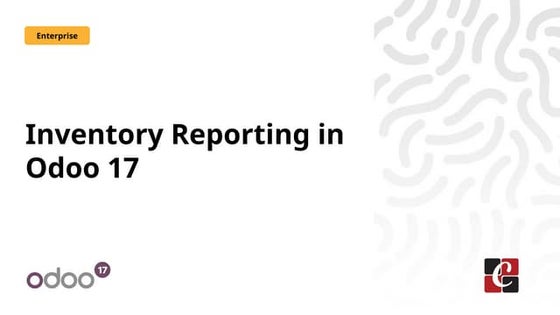



Inventory Reporting in Odoo 17 - Odoo 17 Inventory AppCeline George
Ėý
This slide will helps us to efficiently create detailed reports of different records defined in its modules, both analytical and quantitative, with Odoo 17 ERP.Blind spots in AI and Formulation Science, IFPAC 2025.pdf



Blind spots in AI and Formulation Science, IFPAC 2025.pdfAjaz Hussain
Ėý
The intersection of AI and pharmaceutical formulation science highlights significant blind spotsâsystemic gaps in pharmaceutical development, regulatory oversight, quality assurance, and the ethical use of AIâthat could jeopardize patient safety and undermine public trust. To move forward effectively, we must address these normalized blind spots, which may arise from outdated assumptions, errors, gaps in previous knowledge, and biases in language or regulatory inertia. This is essential to ensure that AI and formulation science are developed as tools for patient-centered and ethical healthcare.Effective Product Variant Management in Odoo 18



Effective Product Variant Management in Odoo 18Celine George
Ėý
In this slide weâll discuss on the effective product variant management in Odoo 18. Odoo concentrates on managing product variations and offers a distinct area for doing so. Product variants provide unique characteristics like size and color to single products, which can be managed at the product template level for all attributes and variants or at the variant level for individual variants.Comprehensive Guide to Antibiotics & Beta-Lactam Antibiotics.pptx



Comprehensive Guide to Antibiotics & Beta-Lactam Antibiotics.pptxSamruddhi Khonde
Ėý
ðĒ Comprehensive Guide to Antibiotics & Beta-Lactam Antibiotics
ðŽ Antibiotics have revolutionized medicine, playing a crucial role in combating bacterial infections. Among them, Beta-Lactam antibiotics remain the most widely used class due to their effectiveness against Gram-positive and Gram-negative bacteria. This guide provides a detailed overview of their history, classification, chemical structures, mode of action, resistance mechanisms, SAR, and clinical applications.
ð What Youâll Learn in This Presentation
â
History & Evolution of Antibiotics
â
Cell Wall Structure of Gram-Positive & Gram-Negative Bacteria
â
Beta-Lactam Antibiotics: Classification & Subtypes
â
Penicillins, Cephalosporins, Carbapenems & Monobactams
â
Mode of Action (MOA) & Structure-Activity Relationship (SAR)
â
Beta-Lactamase Inhibitors & Resistance Mechanisms
â
Clinical Applications & Challenges.
ð Why You Should Check This Out?
Essential for pharmacy, medical & life sciences students.
Provides insights into antibiotic resistance & pharmaceutical trends.
Useful for healthcare professionals & researchers in drug discovery.
ð Swipe through & explore the world of antibiotics today!
ð Like, Share & Follow for more in-depth pharma insights!ASP.NET Interview Questions PDF By ScholarHat



ASP.NET Interview Questions PDF By ScholarHatScholarhat
Ėý
ASP.NET Interview Questions PDF By ScholarHatHow to Configure Proforma Invoice in Odoo 18 Sales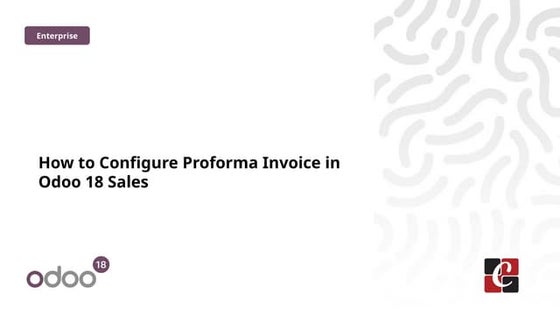



How to Configure Proforma Invoice in Odoo 18 SalesCeline George
Ėý
In this slide, weâll discuss on how to configure proforma invoice in Odoo 18 Sales module. A proforma invoice is a preliminary invoice that serves as a commercial document issued by a seller to a buyer.Meeting the needs of modern students?, Selina McCoy



Meeting the needs of modern students?, Selina McCoyEconomic and Social Research Institute
Ėý
NAPD Annual Symposium
âEquity in our Schools: Does the system deliver for all young people?âHelping Autistic Girls Shine Webinar šÝšÝßĢs



Helping Autistic Girls Shine Webinar šÝšÝßĢsPooky Knightsmith
Ėý
For more information about my speaking and training work, visit: https://www.pookyknightsmith.com/speaking/Year 10 The Senior Phase Session 3 Term 1.pptx



Year 10 The Senior Phase Session 3 Term 1.pptxmansk2
Ėý
Year 10 The Senior Phase Session 3 Term 1.pptxRRB ALP CBT 2 RAC Question Paper MCQ (Railway Assistant Loco Pilot)



RRB ALP CBT 2 RAC Question Paper MCQ (Railway Assistant Loco Pilot)SONU HEETSON
Ėý
RRB ALP CBT 2 RAC Question Paper MCQ PDF Free Download. Railway Assistant Loco Pilot Mechanic Refrigeration and Air Conditioning Important Questions.Dot NET Core Interview Questions PDF By ScholarHat



Dot NET Core Interview Questions PDF By ScholarHatScholarhat
Ėý
Dot NET Core Interview Questions PDF By ScholarHatOne Click RFQ Cancellation in Odoo 18 - Odoo šÝšÝßĢs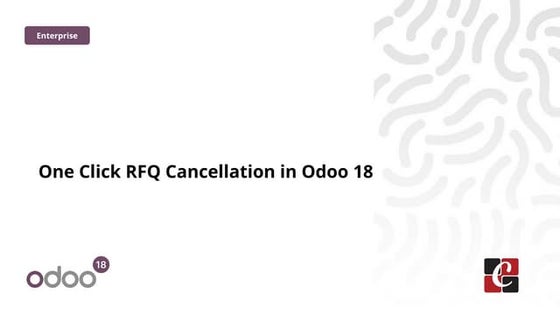



One Click RFQ Cancellation in Odoo 18 - Odoo šÝšÝßĢsCeline George
Ėý
In this slide, weâll discuss the one click RFQ Cancellation in odoo 18. One-Click RFQ Cancellation in Odoo 18 is a feature that allows users to quickly and easily cancel Request for Quotations (RFQs) with a single click.Oral exam Kenneth Bech - What is the meaning of strategic fit?



Oral exam Kenneth Bech - What is the meaning of strategic fit?MIPLM
Ėý
Presentation of the CEIPI DU IPBA oral exam of Kenneth Bech - What is the meaning of strategic fit? Odoo 18 Accounting Access Rights - Odoo 18 šÝšÝßĢs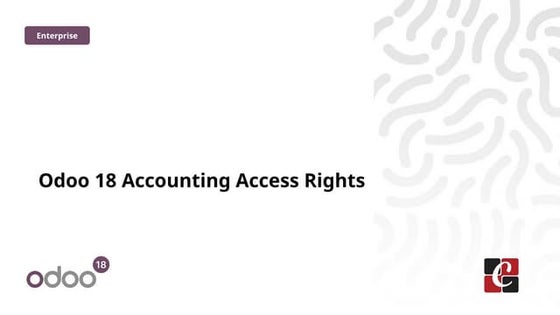



Odoo 18 Accounting Access Rights - Odoo 18 šÝšÝßĢsCeline George
Ėý
In this slide, weâll discuss on accounting access rights in odoo 18. To ensure data security and maintain confidentiality, Odoo provides a robust access rights system that allows administrators to control who can access and modify accounting data. RRB ALP CBT 2 Mechanic Motor Vehicle Question Paper (MMV Exam MCQ)



RRB ALP CBT 2 Mechanic Motor Vehicle Question Paper (MMV Exam MCQ)SONU HEETSON
Ėý
RRB ALP CBT 2 Mechanic Motor Vehicle Question Paper. MMV MCQ PDF Free Download for Railway Assistant Loco Pilot Exam.How to create security group category in Odoo 17



How to create security group category in Odoo 17Celine George
Ėý
This slide will represent the creation of security group category in odoo 17. Security groups are essential for managing user access and permissions across different modules. Creating a security group category helps to organize related user groups and streamline permission settings within a specific module or functionality.TYPES OF GUEST FOLIOS
- 1. FRONT OFFICE ASSISTANT TYPES OF FOLIOS
- 2. FOLIOS âĒ A folio is a statement of all transaction that has taken place in a single account. âĒ It is a written record of guest account and is created at the time of starting book of accounting the name of a guest. âĒ The front office cashiers records all the transactions between the guest and the hotel on the folio. âĒ The folio is opened with zero initial balance. âĒ The balance in the folio then increases or decreases depending upon the transactions. âĒ At the time of check-out, the folio balance must return to zero on settlement of payment ie it begins with a ZERO balance and ends with the SAME. âĒ In between, the balance may be debit or credit depending upon the type of transactions.
- 3. Types of Folios âGuest Folio âMaster Folio âNon-guest Folio âEmployee Folio âSplit folio
- 4. Guest Folio : Assigned to charge for individual guests. It is created for each guest as soon as the first financial transaction take place between the hotel and the guest. generally a folio is created at the time of registration or sometimes at the time of reservation it is open to post in the credit side the advance payment given by the guest as a token to guarantee his reservation.
- 6. Master Folio: Assigned charge for more than one person, usually for Group Accounts./organization i.e. it contains account for more than one guest more common for the entire group master folio is prepared. In small hotels a master folio contains the financial details of all the guest staying in the hotel and by seeing through it one can easily find the net credit or debit balance for the day.
- 8. Split Folios â Accounts assigned to a guest on his/her request to split his/her charges and payments between two personal folios â one to record expenses to be paid by the sponsoring business company and the other to record personal expenses to be paid by the guest.
- 9. Non-guest Folio: Assigned for non-resident guest. It is also called as city folio, it contain the financial transactions between a hotel and its nonresident guest. A hotel may offer credit facility to local businessman; corporate and even city folio is created for that nonresident s guest who avails the club facilities, health centre, sport centre etc facilities offered by the hotel
- 11. Employee Folio: Assigned for hotel employee, his folio contains the credit transactions between hotel and its employees. The folio is created and maintain for employees to whom the hotel has permitted credit facilities, and the amount is later collected from the employees or deducted from their salaries as per the hotels policy.
- 13. Postings in Folios: The process of recording the entries on the folio is called âPostingâ of transactions. There are two basic types of postings: Credit: They reduce the guestâs outstanding balance. These entries include complete or partial payment, or adjustments against tokens. Debit: They increase the outstanding balance in the guest account. Debit entries include charges under restaurant, room-service, health center/spa, laundry, telephone, and transportation.








